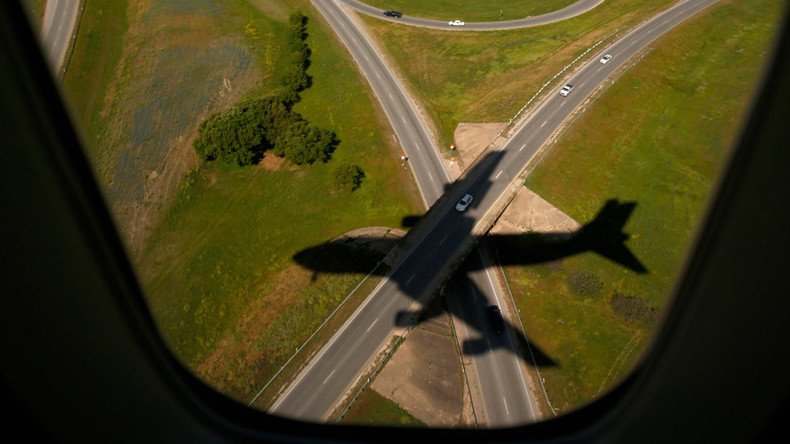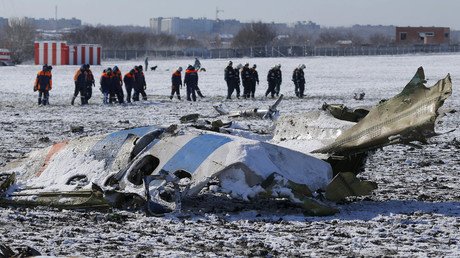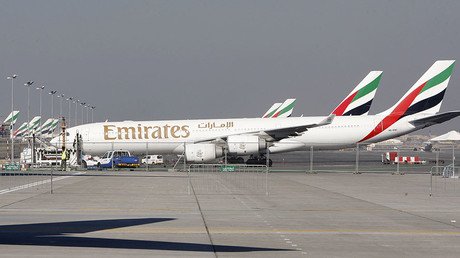Western media performs flyby on RT’s #FlyDubaiGate crash exclusive

Following the crash of Flydubai flight FZ981 in Rostov-on-Don, Russia, RT issued a report based on an insider tip that the accident may have been due to pilot fatigue. Western media ran with the story, failing to mention who originally made it public.
Journalists regularly go out of their way – occasionally risking life and limb - to deliver timely information on issues of immediate concern to their audience. And although ‘breaking a story’ may be as mundane a task as having a message turn up unexpectedly in your email box one lazy afternoon, it is still considered to be - in the language of the trade - a ‘scoop.’ Such exclusive information is generally treated with a high level respect among fellow journalists.
Unfortunately, that was not the manner in which some Western media chose to handle revelations first reported by RT that Flydubai’s management – according to leaked documents provided by a former captain with the budget airline – regularly forced its pilots to work to the point of exhaustion.
On March 22, just days after Flydubai flight FZ981 crashed in southern Russia, killing all 62 passengers and crew aboard, RT became privy to some rather startling information regarding the work culture at the low-cost airline. An anonymous whistleblower provided the flight log of Flight FZ981’s First Officer Alejandro Alava that revealed a loaded schedule prior to the fatal crash: 11 days on the job with only one day off.
According to the informant, Alava had also been transferred from a daytime to nighttime shift without being given enough time to adjust his sleep pattern.
The initial findings were later corroborated by another individual who identified himself as a current Flydubai pilot.
“If anything, since [the original whistleblower to RT] left, things got worse,” the pilot, who spoke on the condition of anonymity because he fears reprisals from his employer, told RT. “The pressure applied to pilots by the management is tremendous.”
#FlyDubaiGate#FZ981 co-pilot 'was fatigued, tremendous pressure made him work' – colleague https://t.co/q2MXt7muUUpic.twitter.com/rb6ydRJX1D
— RT (@RT_com) March 23, 2016
The disturbing allegations prompted aviation experts – like Dr Ian Charles Perry, physician and international aviation consultant - to speculate that pilot fatigue may have been a contributing factor in the crash of Flight FZ981.
The allegations put forward by several disgruntled pilots served as a green light for other industry insiders to speak out on the “modern-day slave"conditions not only at Flydubai, but at Emirates, the largest and most respected commercial airliner in the Middle East.
Pilots from the Dubai-based carrier contacted RT by phone or email on the condition of anonymity, with some saying they literally feared for their lives by speaking about the conditions they witnessed. This outpouring of testimony by airline pilots regarding unfair labor practices acquired its own tag, called #flydubaigate.
One of the pilots described how the airline manipulates its employees with a so-called “fear system,” which is the cause, he said, for many experienced pilots resigning from the company.
“There is a big problem because a lot of experienced [pilots] are leaving now, because they do not want to support this fear system. That’s why people are resigning. That means less people to fly the airplanes, [and with] no newcomers joining. That means more workload on the remaining pilots,” he said.
Replying to RT’s request for comments, Emirates airline denied the allegations, saying they were “based on anonymous people that we cannot confirm currently work or have worked at the airline.”
“We never compromise safety and always operate within the legal regulatory requirements with regard to flying times, operating hours, and layover times in between flights for our pilots,” Emirates PR Manager Rula Tadros wrote in an email.
Now, getting back to the original point of this article. Many otherwise respectable Western media outlets chose to ignore RT’s exclusive findings regarding work conditions at Flydubai, opting instead to follow up on RT’s investigation without so much as mentioning RT in their reports.
In one particular BBC report, which documents “pilot fatigue” due to overwork make up the entire basis of the story without ever mentioning where those revelations first surfaced. Now some readers may be thinking: 'So what, what’s the big deal?' In some ways, I may be tempted to agree with that reaction. However, when we consider the mishandling of 'exclusive' news, at the same time the Western media spins the idea of an “information war” with the West, it makes for some unsettling conclusions.
For example, as the West continues to reinforce the idea that everything and anything remotely related to Russia is inherently bad, it becomes exceedingly unlikely that Western media publications will admit to its audience that professional work – and exclusive reporting – could possibly exist anywhere beyond the realm of the golden West. In other words, since the Western media has heaped so much rubbish at Russia's doorstep, it places them in the awkward position where they cannot give Russia - or Russian media - any amount of due credit because to do so would cut across the grain of their well-worn narrative, thus making them (the Western media) look ridiculous and ill-informed. That type of ‘professional’ approach is terribly unjust to the individuals who are responsible for breaking stories and deserve some recognition for their efforts.
And concerning simple journalistic procedure, not to mention integrity, the crash did occur on Russian territory, which automatically gives reporters based here the geographical advantage of proximity to the incident, as well as the opportunity to receive information from industry insiders who may shed some light on the tragedy, which is exactly what happened. Therefore, it is only natural in such an event for outside media outlets to cite media sources closest to the incident, for the simple reason those outlets have access to more information. This is nothing more than standard operating procedure among journalists, and that is why it is so discomfiting that such normal procedure was not adhered to with regards to this tragedy.
Finally, in the event that RT had not published the leaked revelations regarding the work conditions at Flydubai, there simply would have been no story for BBC to pursue in the first place. That fact alone demonstrates that BBC was grossly irresponsible in its failure to mention RT in this very non-exclusive piece of journalism.
Flydubai is a low-cost airline owned by the United Arab Emirates. It was established in 2008 with the assistance of Emirates Airlines. The two companies have no management connections other than being both owned by the UAE government.
The statements, views and opinions expressed in this column are solely those of the author and do not necessarily represent those of RT.















